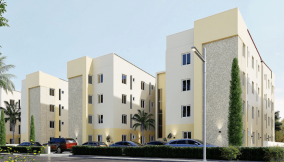Rising cases of building collapse and demolition, especially in the big cities, are sending victims of those incidents back to the rental market, pushing up demand for new homes.
In the last three to five years, the rental market has been very active due to demand pressure on the available housing stock put on the market for rent. The situation changed dramatically from bad to worse in the last six to 12 months, with galloping inflation that has pushed up commodity prices, including those of building materials, to record levels.
Within this period, rent has gone up by between 25 percent and 40 percent and the most affected are affordable and mid- to low-income areas where vacancy rates have come down considerably.
In Lagos, for instance, areas such as Ikotun, Abule Egba, Idimu, Gbagada, Ilupeju, Yaba, Surulere and Magodo on the mainland have recorded significant rent hikes and low vacancy rates. On the Island, the story is the same for areas like Ikoyi, Victoria Island, and along Lekki-Epe Expressway.
Areas such as Jabi, Wuse, Utako and Gwarimpa in Abuja have seen high rent and low vacancy rates, which developers are already taking advantage of. Other cities such as Port Harcourt, Kano, Enugu and Ibadan have the same story to tell.
In Lagos, a three-bedroom apartment in Yaba with great demand has seen rental growth as high as 60 per cent within the last two years. High-end neighbourhoods have enjoyed similar rental growths, but over a longer period.
Close market watchers, including estate managers and property developers, who confirmed the development to BusinessDay, said the situation was triggered by market forces of demand and supply, which generally determine price.
“But there is a new elephant in the China shop now and that is the high rate of building collapse as well as building demolition by government and its agencies which is spreading across many states of the federation at the moment,” Olufunso Adebayo, an estate manager, told BusinessDay.
Adebayo said whether the story is about building collapse or demolition, the housing stock in the country is depleted each time any of these happens, adding: “Building demolition, whenever it happens, sends people back to the housing market, turning landlords to tenants.”
He said apart from the few houses it demolished in Banana Island in reaction to the seven-storey building that collapsed in the area, the Lagos State government had demolished so many buildings it considered defective. There are over 300 houses across the state that are billed for demolition.
“Nobody has anything against the state in its wisdom for demolishing buildings it considers defective and unfit for habitation, but the point has to be made that as more people are displaced from demolished buildings, the more demand for rented accommodation goes up along with rent,” Adebayo said.
Recently, the Federal Airport Authority of Nigeria and the Lagos State Building Control Agency (LASBCA) demolished 13 residential buildings at Rockview Street, Ajao Estate, saying: “The demolition occurred because they were illegally constructed along fuel pipelines.”
Gbolahan Owodunni Oki, general manager of LASBCA, said if the buildings were not removed because of sentiments or aesthetic beauty and cost, the consequences would be dire, as more than 200 buildings might be consumed in the event of gas explosions or collapse.
Similarly, like the Enugu Capital Territory Development Authority, which has planned to demolish over 200 houses in Enugu Lifestyle and Golf City, otherwise known as Centenary City, the Nigeria Police Command also said it intends to demolish 25 barracks in different parts of Lagos alone.
Experts say that these ongoing or planned actions have grave implications for the rental market, especially for the big cities like Lagos where Moruf Akinderu-Fatai, the state’s commissioner for housing, said that over 80 percent of the state’s 20 million population are tenants.
Read also: Shared apartment rental rises on high cost of living
Building collapse is fast becoming a permanent feature of the country’s built environment. Though it occurs all over the country, it is more frequent in the cities with Lagos. Officials of the state government revealed recently that 30 collapsed buildings were recorded in parts of the state between January and July 2022.
Between December 2022 and April 2023, the state recorded about four separate incidents including a seven-storey building under construction in Banana Island, the most exclusive neighbourhood in the state.
According to available statistics, over 461 buildings have collapsed in Nigeria, and these are mostly residential buildings, meaning that many Nigerians return to the housing market as erstwhile landlords or tenants, all looking for new houses or apartments to rent.
“We see housing rents going up further in the days and months to come because there has always been a demand-supply imbalance and now more people are being pushed to the market as victims of either building collapse or demolition,” Adebayo lamented.
Join BusinessDay whatsapp Channel, to stay up to date
Open In Whatsapp





